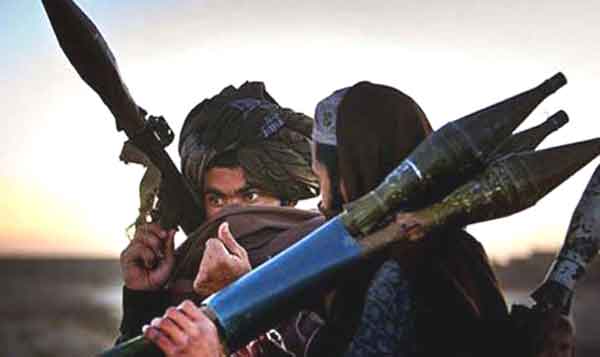It seems there is no change in the policy of the Pakistan army in matters related to Kashmir. The top brass, along with a crop of retired generals, still believes that India should not be allowed to live in peace till it agrees to accept a solution to the Kashmir problem as visualised by Pakistan. Realising its inability to settle the problem by conventional military or diplomatic means, it continues to wage an unconventional conflict, hoping that India will bend finally. Pakistan-sponsored terrorism from across the border involves small, sparsely equipped groups exploiting operational constraints of stronger forces to continue terrorism and subversion in Kashmir. Unconventional war-fighting techniques of these groups have blurred the lines between war and peace, combatants and non-combatants, and rear and forward areas. There are indications that a renewed and more vigorous unconventional assault by Pakistan irregulars on India coinciding with the United States’ withdrawal from Afghanistan is in the offing. India must anticipate the nature of the asymmetric war that it may face in the near future. To meet this new challenge, it may be necessary to reassess and review the basic concepts and theories that underpin the doctrines of fighting Pakistan-sponsored terrorism today.
The Pakistani onslaught can pose multiple threats, ranging from persistent mass terror attacks to simmering low-intensity conflicts waged through sub-national ethnic or religious entities within our country.
The exact nature, forms and contours that a covert war can take in the developing security environments in the South Asian region are still by and large obscure. The diverse forms and shapes the new Pakistani covert war can take may hold many surprises. The current doctrinal concepts for combating Pakistan-sponsored terrorism combined with subversive activities have proved largely ineffective. The dynamics of Pakistan’s emerging asymmetrical strategies may render our superior military capability in J&K largely redundant. We must anticipate and pre-empt future Pakistani designs for evolving appropriate models to pre-empt the new challenges. However, the course of post-modern covert warfare is not easy to discern. The Pakistani onslaught can pose multiple threats, ranging from persistent mass terror attacks to simmering low-intensity conflicts waged through sub-national ethnic or religious entities within our country. This kind of war will not have high-profile military leaders or organised combat units but large, loosely organised groups operating with help and assistance from across international borders.
Large numbers of non-state actors operating at the behest of Pakistan may soon assume the shape of a prolonged armed conflict in Kashmir, along with catastrophic terrorist attacks on high-profile targets in other parts of India. The aim of the terrorist attacks and creation of internal disturbances will be eroding and disturbing the economic, sociocultural and political foundation of the country. Subversion of loyalties of the vulnerable groups, religious indoctrination and efforts to polarise the society will form an intrinsic part of the divisive campaign by Pakistan in India.
In this kind of war, a tailor-made mix of military and political forces and multifaceted action plans will be required to counter Pakistan’s subversive plans and terror attacks. Quite obviously, the potential of conventional forces against an enemy that employs unfamiliar strategies is rather limited, although many political and military leaders maintain that Pakistan-sponsored terrorism has been by and large contained by our security forces. However, situations created by the combined use of sabotage and subversion, terrorism and insurgency by Pakistan have led to some embarrassing political and military problems in the recent past.
The destructive potential of Pakistani-trained terrorists is likely to undergo a radical change with the availability of sophisticated weapons and new technologies.
A covert war waged through non-state actors, fanatics and extremists supported by technology experts operating through secret networks based within the country has the potential to destabilise the country in the long run. The potential of shadowy groups against security forces has generally been underestimated, and the capability of non-state actors of conducting a prolonged and sustained conflict is often treated with disdain; tactical pauses, evasion and escape tactics are often mistaken for termination of hostilities and signs of victory.
Pakistan had chosen terrorism as the main instrument of belligerence in the initial phases of the covert war against India. It now wants to weaken the democratic setup, disrupt the normal life of the people and spread fear and despondency along with fomenting social unrest and subverting the administrative apparatus as a prelude to another covert armed intrusion in Kashmir.
The destructive potential of Pakistani-trained terrorists is likely to undergo a radical change with the availability of sophisticated weapons and new technologies. Postmodern terrorism may set entirely new standards. Future terrorist threats can no longer be measured in terms of small strikes by conventional weapons only. There is a distinct possibility that terrorists may be able to acquire and use chemical, biological, radiological and nuclear (CBRN) weapons. These weapons cannot be used by Pakistani terrorists in Kashmir because they need public support there. However, Pakistani-trained terrorists would have no hesitation in using these in selected areas in J&K and in the rest of India. In Kashmir, the effort will be to instigate mass resistance, “intifada” and insurgency and to sabotage and subvert; terrorist strikes will be mainly against government establishments, lines of communication and security forces.
Terrorism, due to its devastating impact, has become the most visible part of the proxy war in Kashmir, but Pakistan has realised that terrorism will not suffice to dislodge the elected governments in J&K or bring the administration to a grinding halt. Pakistan now wants to initiate a mass movement against the elected J&K government; however, it is likely to prove a non-starter because active support of large segments of the population of Kashmir will not be forthcoming.
Pakistan will focus on fomenting civil unrest in the valley, making full use of new technologies, stealth, surprise and deception, to neutralise the advantages of the security forces. If it succeeds in gaining and sustaining support of the local population, it will be able to infiltrate larger armed groups that could use the local population as a shield in thickly populated areas where the security forces will not be able to exploit their full military potential to avoid unacceptable collateral damage. Terrorists in Kashmir, however, will not able to haul heavy weaponry across the LOC to escalate violence or create a situation in which security forces will be forced to use heavy weapons in populated areas.
Civil unrest, combined with the armed action of radical groups, may assume dangerous proportions if the government does not adopt better and more effective methods to win over the local population. The situation requires greater attention and assistance of the central government to shore up measures of the Kashmir government. The greatest danger to the country is not posed by sponsored terrorism but by a new phenomenon in the form of simmering unrest along with strong armed groups entrenching themselves in thickly populated areas. Pakistan’s new technique of spreading disorder and chaos may be facilitated by the absence of a strong and resolute political leadership, prevailing corruption and unemployment and lack of coordination between the centre and the state government.
Civil unrest, combined with the armed action of radical groups, may assume dangerous proportions if the government does not adopt better and more effective methods to win over the local population.
The prevailing concept of security doctrines will need a radical change for maintaining peace in Kashmir and defeating the new onslaught of a shadowy enemy. It is necessary to study the evolution of new Pakistani strategies and their impact on the people of Kashmir; the correlation between power and force may have to be adjusted greatly in the future to meet the challenges of the new Pakistani plans in Kashmir.
Pakistan Aided Terrorism in the South Asian Region
Pakistan does not accept that organisations such as Lashkar-e-Taiba and Jaish-e-Mohammad have been waging a covert war (jihad) against India from its soil with aid and assistance from the Inter-Services Intelligence (ISI). It is, however, now a well-established fact that the 2008 Mumbai attacks were planned and executed from Pakistan and the attackers were being directed by a Pakistan army officer and other handlers in Pakistan. The Pakistan government denies its involvement in such attacks and maintains that these attacks are the handiwork of non-state actors over which Pakistan has no control.1
The Pakistan army continues to organise, support and nurture mujahideen groups infiltrating into Jammu and Kashmir to wage a proxy war under the directions of the ISI. The banned Bangladeshi Islamic militant group Harkat-ul-Jihad al-Islami, responsible for some terrorist attacks in India, also functions under the ISI. Some such jihadi groups are active in Afghanistan to support the Pakistan army’s pet “strategic depth” doctrine.2







This article is an excellent overview of the reality. The defense establishment in India is weighed heavily in favor of political indecisions. There is no reason to expect Indian government putting up any significant resistance to the Pakistani military tactics of masterminding terrorism acts in India. The current UPA government has no credibility but more excuses. The next Mumbai may be on the drawing board in thePakistani military backrooms with their full confidence of pulling it off again. The people of India need answers, actions and changes before it is too late. While the corrupt netas are protected by gun totting guards, ordinary citizens are left defenseless in the streets and homes.